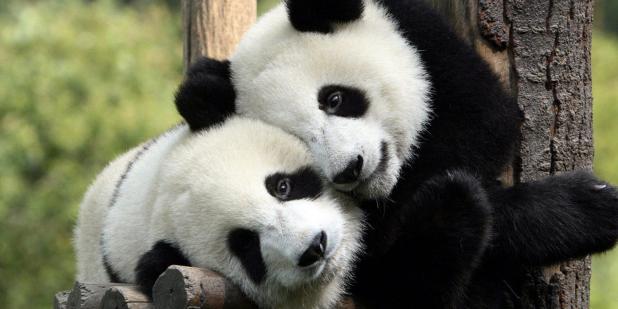Join us for a free one-day workshop for educators at the Japanese American National Museum, hosted by the USC U.S.-China Institute and the National Consortium for Teaching about Asia. This workshop will include a guided tour of the beloved exhibition Common Ground: The Heart of Community, slated to close permanently in January 2025. Following the tour, learn strategies for engaging students in the primary source artifacts, images, and documents found in JANM’s vast collection and discover classroom-ready resources to support teaching and learning about the Japanese American experience.
Panda Nation: The Construction and Conservation of China's Modern Icon
The USC U.S.-China Institute presents a book talk by E. Elena Songster. Her book links the emergence of the giant panda as a national symbol in China to the development of nature protection in the country.

Image: Todorov.petar.p
Click here to register for the event.
About the Book
 Panda Nation links the emergence of the giant panda as a national symbol to the development of nature protection in the People’s Republic of China (PRC), 1949-present. The panda’s transformation into a national treasure exemplifies China’s efforts to distinguish itself as a nation through government-directed science and popular nationalism. Examining this process enhances our understanding of the intersection of policy, science, and the public. Tracing the panda’s iconic rise offers a striking reflection of China’s recent and dramatic ascent in global status. The significant role the giant panda played in the advancement of nature protection policy during the PRC era reveals a striking tension between scientific inquiry and a nationalism particular to Chinese communist ideology. Sichuan’s initial response to the central government’s 1962 directive to protect precious species was to set aside land as reserves for the giant panda. This domestic initiative during a time of extreme isolation, following the Sino-Soviet schism and preceding China’s efforts to reestablish ties with western industrialized nations, forces us to acknowledge that nature played a more complex role in Chinese communist theory and history than is commonly recognized. An examination of the creation of the Wanglang Nature Reserve deepens our understanding of the ways that central government policies incorporated local concerns, Baima minority people, and environmental factors as they were implemented on the ground. This study of the ways that giant pandas have been portrayed and used with respect to national image and diplomacy deepens our understanding of China’s approach in its efforts to reengage with the international community during the 20th century and beyond.
Panda Nation links the emergence of the giant panda as a national symbol to the development of nature protection in the People’s Republic of China (PRC), 1949-present. The panda’s transformation into a national treasure exemplifies China’s efforts to distinguish itself as a nation through government-directed science and popular nationalism. Examining this process enhances our understanding of the intersection of policy, science, and the public. Tracing the panda’s iconic rise offers a striking reflection of China’s recent and dramatic ascent in global status. The significant role the giant panda played in the advancement of nature protection policy during the PRC era reveals a striking tension between scientific inquiry and a nationalism particular to Chinese communist ideology. Sichuan’s initial response to the central government’s 1962 directive to protect precious species was to set aside land as reserves for the giant panda. This domestic initiative during a time of extreme isolation, following the Sino-Soviet schism and preceding China’s efforts to reestablish ties with western industrialized nations, forces us to acknowledge that nature played a more complex role in Chinese communist theory and history than is commonly recognized. An examination of the creation of the Wanglang Nature Reserve deepens our understanding of the ways that central government policies incorporated local concerns, Baima minority people, and environmental factors as they were implemented on the ground. This study of the ways that giant pandas have been portrayed and used with respect to national image and diplomacy deepens our understanding of China’s approach in its efforts to reengage with the international community during the 20th century and beyond.
About the Author
 E. Elena Songster teaches at the Saint Mary's College of California on Chinese History, Japanese History, Asian History, and World History. She has also taught in the Collegiate Seminar Program, and JanTerm and serves on the Advisory Board for the Global and Regional Studies Program. Her research focuses on the environmental history of modern China.
E. Elena Songster teaches at the Saint Mary's College of California on Chinese History, Japanese History, Asian History, and World History. She has also taught in the Collegiate Seminar Program, and JanTerm and serves on the Advisory Board for the Global and Regional Studies Program. Her research focuses on the environmental history of modern China.
Featured Articles
Please join us for the Grad Mixer! Hosted by USC Annenberg Office of International Affairs, Enjoy food, drink and conversation with fellow students across USC Annenberg. Graduate students from any field are welcome to join, so it is a great opportunity to meet fellow students with IR/foreign policy-related research topics and interests.
RSVP link: https://forms.gle/1zer188RE9dCS6Ho6
Events
Hosted by USC Annenberg Office of International Affairs, enjoy food, drink and conversation with fellow international students.
Join us for an in-person conversation on Thursday, November 7th at 4pm with author David M. Lampton as he discusses his new book, Living U.S.-China Relations: From Cold War to Cold War. The book examines the history of U.S.-China relations across eight U.S. presidential administrations.




